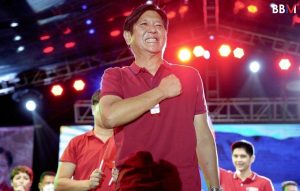The Commission on Elections (Comelec) has junked several cases seeking the disqualification of former Senator Ferdinand Marcos Jr., which could pave the way for his proclamation as the next president of the Philippines after garnering a sizeable lead in this week’s presidential election.
But Marcos faces several challenges, despite his phenomenal victory. First, there are remaining disqualification cases that have to be resolved by Comelec. These cases could also reach the Supreme Court in the next few weeks or months, which could undermine his presidency. If the court disqualifies him after his proclamation, legal scholars believe that his successor should be the new vice president, who happens to be his running mate in the election, Davao City Mayor Sara Duterte.
Second, the credibility of the election results is being questioned by an increasing number of stakeholders after the Comelec acknowledged that almost 2,000 vote-counting machines malfunctioned on election day. There were also several instances of poll violence, voter disenfranchisement, and alleged statistical anomalies in the transmission of results.
The person who could lead an electoral protest against Marcos is no less than Vice President Leni Robredo, who was placed second in the presidential race. In a message addressed to supporters, Robredo mentioned the irregularities reported by the media and expressed her intent that results should reflect the true sentiment of the people. She repeated her concern about the mounting documented reports of voting fraud in local voting centers when she announced on Tuesday morning that she will lead a Thanksgiving event in Manila at the end of the week. She added that her team has tapped experts to look into these cases.
The new government’s legitimacy will be tainted once Robredo decides to formally challenge the election victory of Marcos. The massive crowds which Robredo successfully gathered in her proclamation rallies across the country could become a potential new force capable of exerting strong political pressure on the new government. These are mostly young, tech-savvy, first-time voters and volunteers who were energized by Robredo’s candidacy.
Unlike previous election winners, Marcos cannot expect a honeymoon period during the first 100 days of his presidency. His candidacy was too polarizing in a highly fragmented society gripped with severe joblessness during the pandemic, a healthcare system on the verge of collapse, a debt-ridden domestic economy, and the continuing armed conflict in the countryside. He stoked the anger of Martial Law victims who still wanted to pursue justice and accountability. For the generation who defied the dictatorship, the candidacy of Marcos Jr only became possible through the fraudulent use of ill-gotten wealth. They claimed that Marcos “stole” his way back to the presidential palace by manipulating public opinion through a systematic campaign of spreading false narratives about the supposed “golden years” during the two-decade presidency of his late father. When social media platforms finally decided to block accounts promoting disinformation about the Marcos era, it was already too late. Fact-checked reports did not reach enough voters who were exposed to distorted content about the legacy of the Marcos family.
The presumptive president can claim that majority of voters are on his side, but the other side which didn’t vote for him is not yet ready to accept the restoration of the Marcoses. This constituency does not only refer to supporters of Robredo but veteran activists and influential voices in society who continue to celebrate the removal of the Marcoses from power in 1986 and the defeat of Marcos Jr. when he ran for vice president in 2016.
Marcos ran on a platform of building unity in the country. Can he convince those who suffered during the Martial Law years to unite with him even if he continues to deny that atrocities were committed in the past? Is unity possible between Marcoses and other political forces which wanted to reclaim the ill-gotten wealth of the family? What kind of unity will Marcos promote if the demands for truth, justice, and accountability are addressed to his own family?
It is too early for Marcos to celebrate because even if the voting has ended, the political opposition is not eager to surrender the fight for what they think is right and just for the nation’s future.

































